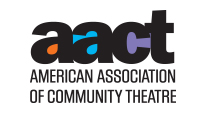Theatre Terms
 As a service to the theatre community, AACT provides over 1000 definitions of theatrical terms. Fully searchable, our glossary is helpful for technical staff, directors, actors, producers, or anyone wanting to better understand the inner workings of theatre.
As a service to the theatre community, AACT provides over 1000 definitions of theatrical terms. Fully searchable, our glossary is helpful for technical staff, directors, actors, producers, or anyone wanting to better understand the inner workings of theatre.
HOW TO SEARCH:
Click on a letter (A-Z) below to find terms beginning with the specified letter, OR enter a word in "Search for Term" OR search by entering a word in "Words in Definition." For example, entering the word "curtain" would display all words whose definition includes that word. (Note: If the A-Z or word search has been activated, it must be reset before using "Search for Term" or "Words in Definition." To reset the A-Z search: Click Here)
| Term | Definition | Link |
|---|---|---|
| PYROTECHNICS | Chemical explosive or flammable firework effects with a manual detonation. Usually electrically fired with special designed fail-safe equipment. Types of pyro range from the Theatrical Flash (a flash and a cloud of smoke) to the Maroon (which produces a very loud bang). All pyrotechnics should be used with close reference to local licensing laws, and the manufacturers instructions. Most theatres require a professional, licensed pyrotechnician to be in charge. | |
| QUICK STUDY | An actor who can memorize lines quickly, as in "She's a quick study." | |
| RACK | A cabinet of standard width (19") into which various components can be bolted. Racks are ideal for touring equipment, are neat, and they allow easy access to the rear and front panels. | |
| RADIO CONTROL | System whereby battery-powered practicals / props on stage can be controllable from offstage with no connecting leads. | |
| RADIO MIC | Device consisting of a microphone head, transmitter pack with batteries, aerial and mains receiver unit which allows actors and singers to be amplified with no visible means of connection. Almost universally used in musicals where the singers have to be amplified to be heard over the orchestra / band. Used in non-musical shows for sound reinforcement. | Microphone |
| RAIN BOX | A box or tray containing dried peas, etc. which produces a rain sound effect when inclined. | |
| RAKE | The slope of a stage or an auditorium. Thus, a raked stage is one that (normally) slopes upward from downstage to upstage. | Raked Stage |
| RAKED STAGE | A sloping stage which is raised at the back (upstage) end. All theatres used to be built with raked stages as a matter of course. Today, the stage is often left flat and the auditorium is raked to improve the view of the stage from all seats. | |
| RAMP | A sloping platform on which an actor may walk. A ramp may lead up to the stage from the auditorium floor, from the stage floor to a platform, etc. | |
| RC or R.C. | Abbreviation for right center. | |
| RE-RIG | To change the lighting rig after the last performance of one show to the positions for the next show. | |
| READ FOR A PART | In auditions, to read one's lines aloud to a stage director or casting agent. | |
| READERS THEATRE or READER'S THEATRE | Presentation of a play in which the actors read from scripts, usually with no movement or staging. | |
| READING | 1) A rehearsal at which the actors read their parts aloud without stage movement or stage business; often the first rehearsal, to break the ice and to give the company an opportunity to get acquainted with each other as performers. 2) A presentation of a new play for or by the author, using scripts, again with no movement or stage business. 3) An actor's interpretation of his lines, as in "That's an interesting reading." | |
| REAR OF HOUSE (ROH) | The backstage and storage areas of the theatre. | |
| REAR PROJECTION | Projection | |
| REGIONAL THEATRE | Said of theatres of a particular region, or of theatres in general outside of major theatrical centers, individually or collectively. | |
| REHEARSAL | A practice session to prepare a production for public performance. | |
| REHEARSE | To prepare a play for production; in particular, the work with actors to blend lines, characterization, movement and stage business into a coherent whole. Derives from the French rehercer, to harrow, to break up and loosen the soil. | |
| RENTAL | Scripts normally are purchased. However, in the case of musicals, vocal music, piano accompaniment, piano conductor score, and individual orchestra parts are rented. (In some cases, scripts also are rented.) The standard rental time is two months prior to your initial performance. Additional fees apply for each additional rental week. |




